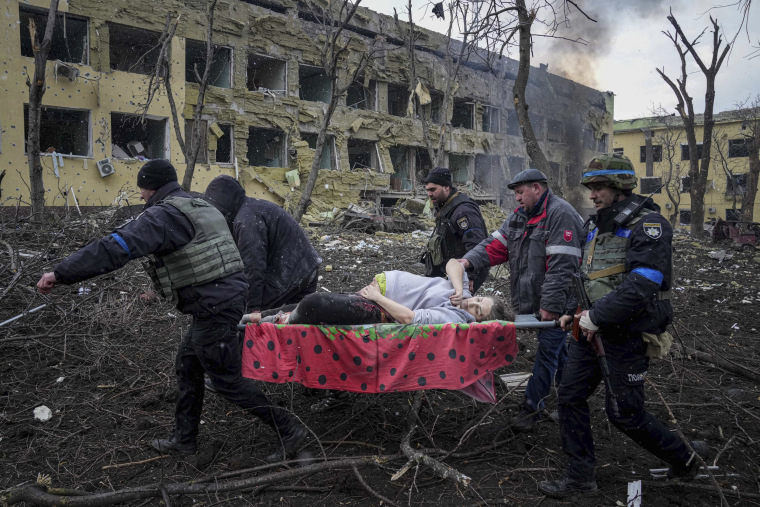Ukrainian President Volodymyr Zelenskyy has a clear label for Russia’s crimes against Ukrainian civilians. “This is genocide,” Zelenskyy declared Sunday on CBS News’ “Face the Nation” as reports emerged of murdered civilians and mass graves in Bucha, a town outside the Ukrainian capital, Kyiv. Images showed corpses lying in the streets with their arms and legs bound, some bearing signs of torture, others having been killed at close range.
Zelenskyy’s labeling of the Russian atrocities as genocide could muddy the waters in a different case already pending before the International Court of Justice.
The murders in Bucha are the latest in a long line of atrocities allegedly committed by Russian forces since they invaded Ukraine on Feb. 24, with the U.N. reporting that Russia has indiscriminately bombed schools, hospitals and apartment buildings.
Zelenskyy’s assertion of genocide and the images from Bucha spurred a new round of support from the West, with the U.S. and European countries forcefully condemning the killings and calling for additional sanctions against Russia. However, President Joe Biden and his advisers have refused to recognize the atrocities as genocide. So are they?
The question is a difficult one, but the answer is likely no. Instead, at this point, these horrific events more clearly constitute war crimes — grave breaches of the Geneva Conventions and other violations of international laws governing armed conflict — and crimes against humanity — wrongdoing committed as part of a systematic attack against a civilian population.
On its face, this issue of terminology may seem trivial, especially in light of the heinous nature of the crimes. However, in a war that has been marked by disinformation, it is imperative that world leaders speak precisely. That is especially true with regard to legal terms like “genocide,” which carries specific responsibilities for nations under the Genocide Convention — such as the requirement to prevent and punish genocide — that are not imposed for other atrocities.
The word “genocide” was coined in 1944 by Polish-Jewish lawyer and activist Raphael Lemkin to refer to the act of destroying an entire group of people. It was then incorporated into the United Nations’ Genocide Convention of 1948, which specifically defines the crime as the commission of certain acts against a national, ethnic, racial or religious group with the intent to destroy it.
It is this requirement of a specific intent to destroy that renders the crime of genocide notoriously difficult to prove in court, especially without perpetrators’ express statements reflecting systemized plans of extermination.
The apparent massacre in Bucha and Russia’s other indiscriminate attacks on civilians involve the killing of members of a national group, namely Ukrainians. But the question of whether Russian forces engaged in these crimes with the aim of destroying the Ukrainian nationality as a whole is far less clear.
On its face, Russian President Vladimir Putin’s statements of his intent to denazify Ukraine simply do not rise to the level of genocidal intent. Even though many in the West dismiss Putin’s claim of denazification as mere pretext, more evidence is needed to determine whether his true goal in invading Ukraine was genocidal. Accordingly, the determination of genocide is likely to be reserved for court.
The classification of Russian atrocities in Ukraine as war crimes and crimes against humanity is far more certain. For example, Russia’s bombing of a maternity hospital in Mariupol last month seems to constitute a direct attack against a civilian population without an apparent military objective, whereas its indiscriminate bombings of civilian targets appear to have been committed with knowledge that such bombings would cause loss of life and injury to civilians far in excess of any anticipated military advantage; both constitute war crimes. Likewise, Russian troops’ suspected murder and torture of Ukrainian civilians in Bucha and other regions fulfill the legal requirements of crimes against humanity.

A certain gravity accompanies the term “genocide,” but labeling an atrocity as a war crime or a crime against humanity does not render it a “lesser” offense. Certainly, the impact of the atrocity is no less severe or deserving of justice because of its title.
On the other hand, Zelenskyy’s labeling of the Russian atrocities as genocide could muddy the waters in a different case already pending before the International Court of Justice. In February, Ukraine instituted proceedings before the U.N.’s World Court alleging that Russia falsely claimed that acts of genocide were being perpetrated against Russian-speaking Ukrainians in the Donbas region of the country and that Russia wrongfully relied on these false claims to justify its “denazification” campaign in Ukraine.
At the same time, there are already many ongoing investigations into Russian crimes in Ukraine, such as the investigation recently opened by the prosecutor of the International Criminal Court investigating allegations of crimes against humanity, war crimes and genocide in Ukraine.
The ICC has the potential to hold Russian military officials, soldiers and even governmental leaders individually and criminally accountable through prison time. While the threat of this punishment seems to have done little to curb Putin’s actions, once the conflict is over, the court is likely to be the best — and potentially the only — way to provide justice to Ukrainian victims in the war crimes trials that Zelenskyy and other leaders have called for.
(It is also important to note that the ICC investigation is not limited to alleged crimes committed by Russia; should evidence suggest that Ukraine also committed war crimes — such as by abusing Russian POWs and harming their dignity by forcing them to speak out against Putin in news conferences — the ICC may also investigate those alleged crimes.)
Countries and individuals should be spurred to action by the reports emerging from Mariupol and Bucha not because of a word, but because of the sobering images and evidence of innocent civilians’ being brutally murdered. Regardless of whether these crimes constitute genocide, war crimes or crimes against humanity, Russia is committing heinous atrocities against civilians in Ukraine and should be held criminally accountable.